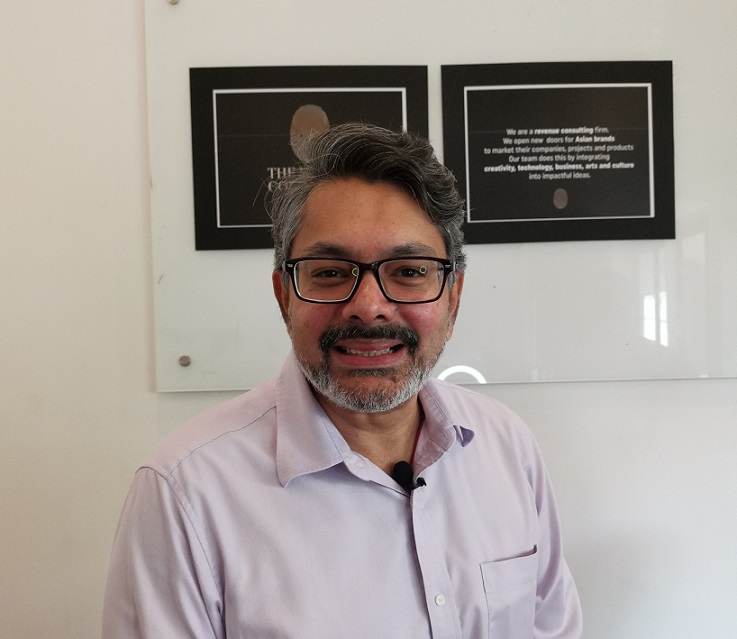In these unprecedented times and how it has affected the local economy, which in turn affects people’s livelihood, many are looking at short-term survival, and many are becoming entrepreneurs. The question is, what is the best strategy for survival in these times? Which sectors or industries should be focused on? How should we move forward into a post-COVID-19 future? News Hub Asia (NHA)’s Ruzanna Muhammad taps into the mind of strategist and business management consultant, Girish M. Ramachandran, who is also the executive director of 27 Group (27 Advisory | 27 Capital | 27 Projects | 27 Digital). With emphasis on the private sector he says now is the right time to “let the tigers out of the cage”. Read on to find out what he means…

Subscribe to our Telegram channel to get a daily dose of business and lifestyle news from NHA – News Hub Asia!
NHA: How important is long-term planning in these times?
Girish: I think planning is the most important thing we should be doing right now. We should not just be sitting down and saying that we cannot go out, we cannot do business… Now is a perfect opportunity to re-strategise, re-think, and re-build; and this is about planning, right? So, whether it is about planning your finances, or maybe scaling down, or maybe it is about growing your business to the next level – this is the right time. In fact, the last nine months is the most important thing; and personally, I have done a few things from March last year – we have launched a few start-ups – and it gave us a lot of time to think and analyse during this period, because you know we are sitting at home and we have our screens in front of us. So, it is a perfect time for organisations as well as governments to re-think and get all that planning out so that when things open up, we are running the race instead of thinking of which race we should run, or which shoes we should wear, or who should run.
Amid the COVID-19 pandemic, what do you think is the role of communication now?
I think communication is extremely important in current times mainly because I think people need to have facts and analysis that is done properly because we are in an unprecedented time right now when COVID is affecting businesses, families, governments, and the man or woman on the street. So, we must be able to have the right communication. There is a lot of fake news and messaging that is going on which is confusing people, so in times of distraught, we do not need further confusion. And people also need to understand that the level of mental stress at the moment is really high; so, we must be able to have communication and branding and marketing that is real and that is impactful and cut all the fluff in between.
What key industries do you think Malaysians should focus on right now?
Malaysia is actually blessed because we have a wealth of industries and sectors. I think the ones that are quite strong are of course the oil and gas, palm oil, the E&E (electronics and electrical) sector, and we also have a strong tourism sector, which is heavily affected (by the COVID-19 pandemic). I would not bank too much on oil and gas because I think it is all about CapEx preservation. Palm oil is great right now, because prices are at an all-time high; but there is a lot of productivity and labour issues. But I would look at agriculture. I think that is something to focus on heavily and go down the whole upstream side of it – the full ambit of agriculture. We are an agricultural nation; I think about 12 per cent of our GDP (gross domestic product), and more than a million or two million people are employed in the sector. I would also look at our domestic tourism because I think that saw a little bit of a shift; everybody started to go out more – to the beach resorts or whatever it is, and that sort of creates new products. And the domestic tourism was never really doing so well because everybody was maybe going to other countries. So, that is an area where I think Malaysia can really propel in as well.
How do we attract investors into the country especially in the sectors you emphasised on i.e., agriculture and tourism?
I think it is a combination of private sector working with government. I think that is going to be the key here. The role of the government is important to set the right policies and provide the right incentives. And I think we are at a stage in Malaysia where we need to sort of refresh. We were very successful in the last 20, 30 years in attracting FDIs (foreign direct investments) but I think the type of incentives and the type of business models that are out there need to change and have more private-public partnerships that are out there that can move this sort of investments.
Generally, Malaysia does fair quite well in terms of FDIs. The last two years, however, have not been the best numbers but I think it is very easy for Malaysia to catch up. We hear a lot of things in Indonesia, pick up a lot of digital data and investment even out of Singapore; but I think that is more around each country, right? So Indonesia was probably a laggard for a long time, but now it is their time because certain things have come in (infra and so on). But if you look at Malaysia, I think we are central – we are in between two of the largest giants in the world who control 50 per cent of the economy in 2016, and we are right in between all the different trade groups. We are multicultural and multilingual; and I think we have some of the smartest entrepreneurs in the world who are actually Malaysians.
So, I think it is just tweaking the model a bit and then we will fly because I think it is sort of like a tiger in a cage, and if you just open up the cage, it goes out. So, we need to figure out what are those cages around us and remove them. I think it is as simple as that; it is not a 10-year plan, it can be done very fast.
How does the free trade agreements within ASEAN work in terms of attracting investment in, and how do we move and do?
I think with ASEAN, there was a lot of work done in the last ten years. Unfortunately, the last four to five years, things are slowing down, and we see the big US pulled out their agreement… But this is essentially a problem with the government, and I think If we wait for the government to solve this it will be too late. We need agile framework especially when you are dealing with technology, you need regulations and framework that can be changed within two months or guideline that allows for certain things to be done and that is going to be crucial. We must be able to look at regional integration. Dependency is very crucial in ASEAN and Malaysia has a very strong role. But I think private sectors need to take the lead… so you know let’s get the private sector out there.
What do you think is the most challenging thing for our economy at the moment?
I think the most challenging thing right now is mindset. Malaysians are quite complacent (in the sense that) if you look at our economy, (the mindset is) it’s oil and gas so it’s about extraction, if you look at palm oil it’s about planting and then you wait four years when you harvest it with labour. So, I think we need to now change our mindsets. We should not be looking at just one level of production: we should be processing; we should be using a lot more technology in all our existing sectors; and then we would be able to show some real strength out there. And this comes back to entrepreneurs.
So, I think we should change our mindsets – organisations and even governments should start wearing the entrepreneur hat. I think that is the solution for Malaysia and it comes back to changing the mindset; and if you are wearing an entrepreneur’s mindset, it’s very different – you get up in the morning and your whole day is a different sort of thing as opposed to being an employee or even employing people. I think you need to wear that hat of an entrepreneur where everybody around you are your entrepreneur colleagues or co-investors going; then we have a lot more accountability and we would be able to move.
But with complacency, we may be quite comfortable; maybe we have two, three generations out there who have done all the hard work, and so a lot of youngsters now are not motivated; they have never seen a recession; they have never received a pay cut… and so this is where we really need to change our hats and focus on entrepreneurship.
Watch this video to listen to Girish’s key message to all out there…




